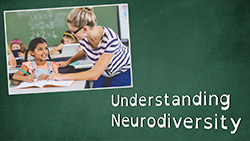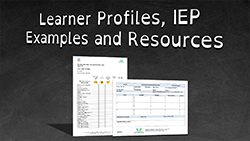Primary
Summary
 This session encourages us to look beyond our initial impression of a struggling learner and develop a full understanding of their specific learning difficulties and learning needs based on detailed observations.
This session encourages us to look beyond our initial impression of a struggling learner and develop a full understanding of their specific learning difficulties and learning needs based on detailed observations.
Summary
 In this session we take a closer look at the terms Neurodiversity and Neurotypical and introduce you to our sample student, Sebastian to show you how to use the checklist to determine a learning profile based on a student’s specific learning difficulties.
In this session we take a closer look at the terms Neurodiversity and Neurotypical and introduce you to our sample student, Sebastian to show you how to use the checklist to determine a learning profile based on a student’s specific learning difficulties.

Summary
The first of these sessions delves into four strategies to support a struggling learner who may have specific learning difficulties: Boosting Self Esteem, Understanding Challenging Behaviour, Motivation and Teaching Metacognition.
Summary
More support strategies are addressed in this session to support a struggling learner who may have specific learning difficulties: Using Positive Language, Multi-sensory Techniques, Giving One Instruction at a Time, Making Text Reader Friendly, Allowing Think Time and Reducing Memory Load.
Summary
This final session of classroom support strategies to support a struggling learner who may have a specific learning difficulties includes: Keeping your Language Simple, Encouraging Alternatives to Handwriting, Supporting Gross Motor Skills, Teaching Organisational Skills, Using Assistive Technology and Having High Expectations.
Summary
This session includes examples of learner profiles enabling you to understand what Neurodiversity is and the most commonly occurring Specific Learning Difficulties such as Dyslexia, Dysgraphia, Dyspraxia, Dyscalculia, ADHD, Autism, Developmental Language Disorder, Working Memory, Anxiety and Trauma. It includes IEP’s, student profile samples and case studies to assist you in supporting your struggling learners.
Summary
The Specific Learning Difficulties Guide offers deeper insight into the most common cooccurrence difficulties including: Dyslexia, Dysgraphia, Dyspraxia, Dyscalculia, Developmental Language Disorder and Working Memory.
Summary
The Specific Learning Difficulties Guide offers deeper insight into ADHD, Autism, Anxiety and Trauma and their impact on learning.Primary Mobile

Summary
This session encourages us to look beyond our initial impression of a student and develop a fuller understanding of their needs based on detailed observations.
Summary
In this session we take a closer look at the terms Neurodiversity and Neurotypical and introduce you to our sample student Sebastian and the checklist.
Summary
The first of these sessions delves into four strategies: Boosting Self Esteem, Understanding Challenging Behaviour, Motivation and Teaching Metacognition.
Summary
More support strategies are addressed in this session: Using Positive Language, Multi-sensory Techniques, Giving One Instruction at a Time, Making Text Reader Friendly, Allowing Think Time and Reducing Memory Load.
Summary
This final session of classroom support strategies includes: Keeping your Language Simple, Encouraging Alternatives to Handwriting, Supporting Gross Motor Skills, Teaching Organisational Skills, Using Assistive Technology and Having High Expectations.
Summary
This session includes examples of Learner Profiles, IEP’s and directs you to the extra resources which accompany this training.
Summary
The Specific Learning Difficulties Guide offers deeper insight into the most common co-occurring difficulties.
Summary
The Specific Learning Difficulties Guide offers deeper insight into ADHD, Autism, Anxiety and Trauma and their impact on learning.Secondary Desktop
Summary
 This session encourages us to look beyond our initial impression of a struggling learner and develop a full understanding of their specific learning difficulties and learning needs based on detailed observations.
This session encourages us to look beyond our initial impression of a struggling learner and develop a full understanding of their specific learning difficulties and learning needs based on detailed observations.

Summary
In this session we take a closer look at the terms Neurodiversity and Neurotypical and introduce you to our sample student, Sebastian to show you how to use the checklist to determine a learning profile based on a student’s specific learning difficulties.
Summary
The first of these sessions delves into four strategies to support a struggling learner who may have specific learning difficulties: Boosting Self Esteem, Understanding Challenging Behaviour, Motivation and Teaching Metacognition.
Summary
More support strategies are addressed in this session to support a struggling learner who may have specific learning difficulties: Using Positive Language, Multi-sensory Techniques, Giving One Instruction at a Time, Making Text Reader Friendly, Allowing Think Time and Reducing Memory Load.
Summary
This final session of classroom support strategies to support a struggling learner who may have a specific learning difficulties includes: Keeping your Language Simple, Encouraging Alternatives to Handwriting, Supporting Gross Motor Skills, Teaching Organisational Skills, Supporting Academic Development, Using Assistive Technology, Teaching Reading and Proof Reading Techniques, Teaching Study Skills and Exam Techniques, Exam Access Arrangements and Having High Expectations.
Summary
This session includes examples of learner profiles enabling you to understand what Neurodiversity is and the most commonly occurring Specific Learning Difficulties such as Dyslexia, Dysgraphia, Dyspraxia, Dyscalculia, ADHD, Autism, Developmental Language Disorder, Working Memory, Anxiety and Trauma. It includes IEP’s, student profile samples and case studies to assist you in supporting your struggling learners.
Summary
The Specific Learning Difficulties Guide offers deeper insight into the most common cooccurrence difficulties including: Dyslexia, Dysgraphia, Dyspraxia, Dyscalculia, Developmental Language Disorder and Working Memory.
Summary
The Specific Learning Difficulties Guide offers deeper insight into ADHD, Autism, Anxiety and Trauma and their impact on learning.Secondary Mobile

Summary
This session encourages us to look beyond our initial impression of a student and develop a fuller understanding of their needs based on detailed observations.
Summary
In this session we take a closer look at the terms Neurodiversity and Neurotypical and introduce you to our sample student Hannah and the checklist.
Summary
The first of these sessions delves into four strategies: Boosting Self Esteem, Understanding Challenging Behaviour, Motivation and Teaching Metacognition.
Summary
More support strategies are addressed in this session: Using Positive Language, Multi-sensory Techniques, Giving One Instruction at a Time, Making Text Reader Friendly, Allowing Think Time and Reducing Memory Load.
Summary
This final session of classroom support strategies includes: Keeping your Language Simple, Encouraging Alternatives to Handwriting, Supporting Gross Motor Skills, Teaching Organisational Skills, Supporting Academic Development, Using Assistive Technology, Teaching Reading and Proof Reading Techniques, Teaching Study Skills and Exam Techniques, Exam Access Arrangements and Having High Expectations.
Summary
This session includes examples of Learner Profiles, IEP’s and directs you to the extra resources which accompany this training.
Summary
The Specific Learning Difficulties Guide offers deeper insight into the most common co-occurring difficulties.
Summary
The Specific Learning Difficulties Guide offers deeper insight into ADHD, Autism, Anxiety and Trauma and their impact on learning.Tertiary
Summary
 This session encourages us to look beyond our initial impression of a struggling learner and develop a full understanding of their specific learning difficulties and learning needs based on detailed observations.
This session encourages us to look beyond our initial impression of a struggling learner and develop a full understanding of their specific learning difficulties and learning needs based on detailed observations.

Summary
In this session we take a closer look at the terms Neurodiversity and Neurotypical and introduce you to our sample student, Sebastian to show you how to use the checklist to determine a learning profile based on a student’s specific learning difficulties.
Summary
The first of these sessions delves into four strategies to support a struggling learner who may have specific learning difficulties: Boosting Self Esteem, Understanding Challenging Behaviour, Motivation and Teaching Metacognition.
Summary
More support strategies are addressed in this session to support a struggling learner who may have specific learning difficulties: Using Positive Language, Multi-sensory Techniques, Giving One Instruction at a Time, Making Text Reader Friendly, Allowing Think Time and Reducing Memory Load.
Summary
This final session of classroom support strategies to support a struggling learner who may have a specific learning difficulties includes: Keeping your Language Simple, Encouraging Alternatives to Handwriting, Supporting Fine Motor Skills, Teaching Organisational Skills, Teaching Reading and Proof Reading Techniques, Teach Study Skills and Exam Techniques, Exam Access Arrangements, Using Assistive Technology and Having High Expectations.
Summary
This session includes examples of learner profiles enabling you to understand what Neurodiversity is and the most commonly occurring Specific Learning Difficulties such as Dyslexia, Dysgraphia, Dyspraxia, Dyscalculia, ADHD, Autism, Developmental Language Disorder, Working Memory, Anxiety and Trauma. It includes IEP’s, student profile samples and case studies to assist you in supporting your struggling learners.
Summary
The Specific Learning Difficulties Guide offers deeper insight into the most common cooccurrence difficulties including: Dyslexia, Dysgraphia, Dyspraxia, Dyscalculia, Developmental Language Disorder and Working Memory.
Summary
The Specific Learning Difficulties Guide offers deeper insight into ADHD, Autism, Anxiety and Trauma and their impact on learning.Tertiary Mobile

Introduction
This session encourages us to look beyond our initial impression of a student and develop a fuller understanding of their needs based on detailed observations.
Introduction
In this session we take a closer look at the terms Neurodiversity and Neurotypical and introduce you to our sample student Phoenix and checklist.
Introduction
The first of these sessions delves into four strategies: Boosting Self Esteem, Understanding Challenging Behaviour, Motivation and Teaching Metacognition.
Introduction
More support strategies are addressed in this session: Using Positive Language, Multi-sensory Techniques, Giving One Instruction at a Time, Making Text Reader Friendly, Allowing Think Time and Reducing Memory Load.
Introduction
This final session of classroom support strategies includes: Keeping your Language Simple, Encouraging Alternatives to Handwriting, Supporting Fine Motor Skills, Teaching Organisational Skills, Teaching Reading and Proof Reading Techniques, Teach Study Skills and Exam Techniques, Exam Access Arrangements, Using Assistive Technology and Having High Expectations.
Introduction
This session includes examples of Learner Profiles, IEP’s and directs you to the extra resources which accompany this training.
Introduction
The Specific Learning Difficulties Guide offers deeper insight into the most common co-occurring difficulties.
Introduction
The Specific Learning Difficulties Guide offers deeper insight into ADHD, Autism, Anxiety and Trauma and their impact on learning.Maths Course
Summary
Consolidating concepts, why you need to gain perspective and help students to understand the constellation of mathematical learning factors and their interconnectivity. Steve further offers general advice on evidence-based practice.Summary
Numerical Stroop as well as a deeper understanding of the role of long-term memory, speed of working, working memory and sequencing in math.Summary
Research into dialogue, how children develop a sense of number and various strategies to gain a congruent sense of number and place value.Summary
How metacognition and subsequent cognition styles can be used to better understand a student’s mathematical difficulties, anxiety and success. This section includes a checklist to help you better understand the child’s mathematical needs.Long PD Maths Course
Mathematical Learning Difficulties and Dyscalculia
 This session includes the definition of Dyscalculia and the key factors of Specific learning Difficulties in maths; Observing students with maths difficulties and the interconnectivity between their difficulties; The prevalence of dyscalculia and maths learning difficulties and the importance of early teaching and maths performance; The do’s and don’ts of teaching maths to improve maths performance.
This session includes the definition of Dyscalculia and the key factors of Specific learning Difficulties in maths; Observing students with maths difficulties and the interconnectivity between their difficulties; The prevalence of dyscalculia and maths learning difficulties and the importance of early teaching and maths performance; The do’s and don’ts of teaching maths to improve maths performance.
The Developmental Nature of Maths
 This session discusses the importance of getting the basics right, knowing where the basics are going, and how later maths relies very heavily on the early maths. It clearly demonstrates tracking forward with younger students and how to track back to the very basics for older students.
This session discusses the importance of getting the basics right, knowing where the basics are going, and how later maths relies very heavily on the early maths. It clearly demonstrates tracking forward with younger students and how to track back to the very basics for older students.
Number Sense, Operation Sense and Place Value
 This session covers the importance of consistency when using visual patterns to support learners for counting both forwards and backwards. It offers an introduction to linking addition and subtraction operations and number facts. It covers key teaching strategies for scaffolding when teaching place value.
This session covers the importance of consistency when using visual patterns to support learners for counting both forwards and backwards. It offers an introduction to linking addition and subtraction operations and number facts. It covers key teaching strategies for scaffolding when teaching place value.
Alternative methods of teaching addition and subtraction
 This session will help you to support learners by encouraging them to use what they know, to work out what they don’t know, so as to avoid excessive demand on fallible long-term memory. It advocates for students to become familiar with number by using visual support, manipulatives, maths toolkits, estimations, patterns and sequences.
This session will help you to support learners by encouraging them to use what they know, to work out what they don’t know, so as to avoid excessive demand on fallible long-term memory. It advocates for students to become familiar with number by using visual support, manipulatives, maths toolkits, estimations, patterns and sequences.
Using scaffolding to support addition and subtraction for larger numbers
 This session covers the varying levels of scaffolding and renaming when working with hundreds, tens and ones to support maths learners. It offers clear demonstrations of using resources to support subtraction, across zero, of larger numbers e.g. 103-28.
This session covers the varying levels of scaffolding and renaming when working with hundreds, tens and ones to support maths learners. It offers clear demonstrations of using resources to support subtraction, across zero, of larger numbers e.g. 103-28.
The basic facts of mastering multiplication and division
 This session looks at the research into mastering the multiplication facts. It discusses teacher flexibility as ‘nothing works for everyone’. It uncovers mathematically valid and easy strategies of committing the multiplication facts to memory and how to link multiplication to division. It demonstrates the resources required to support learners, so as to avoid any feelings of overwhelm, caused by the number of facts they are required to master.
This session looks at the research into mastering the multiplication facts. It discusses teacher flexibility as ‘nothing works for everyone’. It uncovers mathematically valid and easy strategies of committing the multiplication facts to memory and how to link multiplication to division. It demonstrates the resources required to support learners, so as to avoid any feelings of overwhelm, caused by the number of facts they are required to master.
The affective domain and Maths Anxiety
 This video session explores maths anxiety and its impact on learning. Steve discusses the research behind the emotional and motivational factors relating to maths fear and difficulties.
This video session explores maths anxiety and its impact on learning. Steve discusses the research behind the emotional and motivational factors relating to maths fear and difficulties.
The affective domain and Maths Anxiety Continued
 This session discusses the types of anxiety and the main factors contributing to maths anxiety. Steve provides dozens of excellent, realistic examples of best practice to promote meaningful success and learner self-belief.
This session discusses the types of anxiety and the main factors contributing to maths anxiety. Steve provides dozens of excellent, realistic examples of best practice to promote meaningful success and learner self-belief.
Identifying and using error patterns to support learners
 This session covers the need for monitoring learners to identify where they struggle and guide targeted intervention. Steve investigates the types of errors, the most common errors and works through very practical aspects of understanding these mathematical errors. This session assists in developing a deeper understanding of error patterns when screening and supporting students with maths learning difficulties and dyscalculia.
This session covers the need for monitoring learners to identify where they struggle and guide targeted intervention. Steve investigates the types of errors, the most common errors and works through very practical aspects of understanding these mathematical errors. This session assists in developing a deeper understanding of error patterns when screening and supporting students with maths learning difficulties and dyscalculia.
Diagnosis and Assessment of maths Learning Difficulties and Dyscalculia
 This section demystifies the concept of identifying maths learning difficulties. It addresses the difference between assessment and a diagnosis. Steve highlights the process of the lead up to a diagnosis and the importance of checking the basics.
This section demystifies the concept of identifying maths learning difficulties. It addresses the difference between assessment and a diagnosis. Steve highlights the process of the lead up to a diagnosis and the importance of checking the basics.
Diagnosis and Assessment of maths Learning Difficulties and Dyscalculia Continued
 This session continues the discussion of identifying maths learning difficulties. In the session Steve works through the structure of screening for maths learning difficulties in an easy, step by step process.
This session continues the discussion of identifying maths learning difficulties. In the session Steve works through the structure of screening for maths learning difficulties in an easy, step by step process.
Developmental Coordination Disorder
What is Developmental Coordination Disorder (DCD)?
 • A definitive look at the definition, occurrence, research and diagnostic criteria of DCD.
• A definitive look at the definition, occurrence, research and diagnostic criteria of DCD.• Delve into other childhood illnesses, including those that are commonly mistaken for DCD, as well as ones that overlap, making proper assessment difficult for the untrained observer.
• The vital role of early identification and teacher knowledge in early years.
• The common characteristics in DCD, both motor and non-motor, and their impact on learning.
How does DCD present in Early Years
 • The key factors in early identification of DCD.
• The key factors in early identification of DCD.• The ‘at risk’ indicators for teachers, parents and allied health professionals.
• DCD characteristics and the importance of personalised intervention strategies.
• How DCD in early years impacts the life journey of a child.
Practical Strategies for DCD/Dyspraxia Early Years
 • The key foundation stages of DCD.
• The key foundation stages of DCD.• Developmental Stages in the Early Years, relating to self-care, gross motor skills and balance.
• Strategies for early years success; described and prioritised for independence.
• The stages of pre-writing development and pre-scissor skills.
• Research and evidence based strategies to aid writing and motor development.
How does DCD present in Primary/Elementary School?
 • Help in identifying the characteristics of DCD in primary/elementary aged learners based on observation in the classroom and in the schoolground.
• Help in identifying the characteristics of DCD in primary/elementary aged learners based on observation in the classroom and in the schoolground.• Quick reference checklists with highly effective tips for working with colleagues and parents to compile a profile of a student’s DCD difficulties.
Practical Strategies for DCD/Dyspraxia Primary/Elementary School
 • The most effective strategies for addressing DCD in the classroom and school.
• The most effective strategies for addressing DCD in the classroom and school.• How to prioritise the best DCD strategies for the greatest impact.
• Understand the vital social and emotional aspects of DCD.
• Discover the environmental demands on students at school and home.
• Analysis of movement demands required to complete tasks.
How does DCD present in Secondary/High School?
 • The transition from Primary/Elementary School to High School for the child with DCD.
• The transition from Primary/Elementary School to High School for the child with DCD.• Key insights around common transitional challenges.
• The interacting factors and the four main features of DCD in high school relating to motor and non-motor skills.
• DCD presentation and the persistent predictors of DCD.
• The DCD protective factors.
• The value of a personalised program for students with DCD in high school.
Practical Strategies for DCD/Dyspraxia Secondary/High School
 • A birds eye view of the characteristics of DCD in Secondary/High School.
• A birds eye view of the characteristics of DCD in Secondary/High School.• Explore a student profile and the strategies to support them.
• Look at the 8 pillars of support strategies for implementation within a high school setting.
• The value of using the ‘whole learner approach.’
• The vital non- motor, social and emotional support strategies
Screening for DCD/Dyspraxia in Early Years and Primary /Elementary School
 • Demystify the DCD screening process.
• Demystify the DCD screening process.• Identify the triggers for conducting a screening for DCD.
• Delve into the research behind the main DCD impairments.
• Co-occurrence, screening tools and checklists.
• The research basis of screening tools.
• Research into DCD and Intelligence Assessments.
Practical Strategies for use at Home
 • Evidence-based practical strategies for supporting students and parents at home.
• Evidence-based practical strategies for supporting students and parents at home.• The importance of a parent/teacher partnership approach.
• The 6 ‘F-words’ – Function, family, fitness, fun, friends and future.
• Setting priorities and routines matched to the student’s needs.
• Altering expectations and adapting the environment.
• Understanding the social/emotional impact and the importance of sleep.
Supporting Students with Handwriting Difficulties
 • Dive into DCD and Dysgraphia.
• Dive into DCD and Dysgraphia.• Orthographic, phonological and graphomotor codes.
• Research into handwriting difficulty statistics and DCD.
• Co-existing difficulties such as text generation and transcription.
• Executive functioning and organisational skills.
• Classroom observation and teaching strategies.
• Discuss the best tools and adaptations for Handwriting in the classroom environment.
Developmental Coordination Disorder - Early Years
What is Developmental Coordination Disorder (DCD)?
 • A definitive look at the definition, occurrence, research and diagnostic criteria of DCD.
• A definitive look at the definition, occurrence, research and diagnostic criteria of DCD.• Delve into other childhood illnesses, including those that are commonly mistaken for DCD, as well as ones that overlap, making proper assessment difficult for the untrained observer.
• The vital role of early identification and teacher knowledge in early years.
• The common characteristics in DCD, both motor and non-motor, and their impact on learning.
How does DCD present in Early Years
 • The key factors in early identification of DCD.
• The key factors in early identification of DCD.• The ‘at risk’ indicators for teachers, parents and allied health professionals.
• DCD characteristics and the importance of personalised intervention strategies.
• How DCD in early years impacts the life journey of a child.
Practical Adjustments for DCD/Dyspraxia Early Years
 • The key foundation stages of DCD.
• The key foundation stages of DCD.• Developmental Stages in the Early Years, relating to self-care, gross motor skills and balance.
• Strategies for early years success; described and prioritised for independence.
• The stages of pre-writing development and pre-scissor skills.
• Research and evidence based strategies to aid writing and motor development.
Screening for DCD/dyspraxia in Early Years.
 • Demystify the DCD screening process.
• Demystify the DCD screening process.• Identify the triggers for conducting a screening for DCD.
• Delve into the research behind the main DCD impairments.
• Co-occurrence, screening tools and checklists.
• The research basis of screening tools.
• Research into DCD and Intelligence Assessments.
Practical Strategies for use at Home
 • Evidence-based practical strategies for supporting students and parents at home.
• Evidence-based practical strategies for supporting students and parents at home.• The importance of a parent/teacher partnership approach.
• The 6 ‘F-words’ – Function, family, fitness, fun, friends and future.
• Setting priorities and routines matched to the student’s needs.
• Altering expectations and adapting the environment.
• Understanding the social/emotional impact and the importance of sleep.
Supporting Students with Handwriting Difficulties
 • Dive into DCD and Dysgraphia.
• Dive into DCD and Dysgraphia.• Orthographic, phonological and graphomotor codes.
• Research into handwriting difficulty statistics and DCD.
• Co-existing difficulties such as text generation and transcription.
• Executive functioning and organisational skills.
• Classroom observation and teaching strategies.
• Discuss the best tools and adaptations for Handwriting in the classroom environment.
Developmental Coordination Disorder - Primary
What is Developmental Coordination Disorder (DCD)?
 • A definitive look at the definition, occurrence, research and diagnostic criteria of DCD.
• A definitive look at the definition, occurrence, research and diagnostic criteria of DCD.• Delve into other childhood illnesses, including those that are commonly mistaken for DCD, as well as ones that overlap, making proper assessment difficult for the untrained observer.
• The vital role of early identification and teacher knowledge in early years.
• The common characteristics in DCD, both motor and non-motor, and their impact on learning.
How does DCD present in Primary/Elementary School?
 • Help in identifying the characteristics of DCD in primary/elementary aged learners based on observation in the classroom and in the schoolground.
• Help in identifying the characteristics of DCD in primary/elementary aged learners based on observation in the classroom and in the schoolground.• Quick reference checklists with highly effective tips for working with colleagues and parents to compile a profile of a student’s DCD difficulties.
Practical Strategies for DCD/Dyspraxia Primary/Elementary School
 • The most effective strategies for addressing DCD in the classroom and school.
• The most effective strategies for addressing DCD in the classroom and school.• How to prioritise the best DCD strategies for the greatest impact.
• Understand the vital social and emotional aspects of DCD.
• Discover the environmental demands on students at school and home.
• Analysis of movement demands required to complete tasks.
Screening for DCD/dyspraxia in Primary/Elementary School.
 • Demystify the DCD screening process.
• Demystify the DCD screening process.• Identify the triggers for conducting a screening for DCD.
• Delve into the research behind the main DCD impairments.
• Co-occurrence, screening tools and checklists.
• The research basis of screening tools.
• Research into DCD and Intelligence Assessments.
Practical Strategies for use at Home
 • Evidence-based practical strategies for supporting students and parents at home.
• Evidence-based practical strategies for supporting students and parents at home.• The importance of a parent/teacher partnership approach.
• The 6 ‘F-words’ – Function, family, fitness, fun, friends and future.
• Setting priorities and routines matched to the student’s needs.
• Altering expectations and adapting the environment.
• Understanding the social/emotional impact and the importance of sleep.
Supporting Students with Handwriting Difficulties
 • Dive into DCD and Dysgraphia.
• Dive into DCD and Dysgraphia.• Orthographic, phonological and graphomotor codes.
• Research into handwriting difficulty statistics and DCD.
• Co-existing difficulties such as text generation and transcription.
• Executive functioning and organisational skills.
• Classroom observation and teaching strategies.
• Discuss the best tools and adaptations for Handwriting in the classroom environment.
Developmental Coordination Disorder - Secondary
What is Developmental Coordination Disorder (DCD)?
 • A definitive look at the definition, occurrence, research and diagnostic criteria of DCD.
• A definitive look at the definition, occurrence, research and diagnostic criteria of DCD.• Delve into other childhood illnesses, including those that are commonly mistaken for DCD, as well as ones that overlap, making proper assessment difficult for the untrained observer.
• The vital role of early identification and teacher knowledge in early years.
• The common characteristics in DCD, both motor and non-motor, and their impact on learning.
How does DCD present in Secondary/High School?
 • The transition from Primary/Elementary School to High School for the child with DCD.
• The transition from Primary/Elementary School to High School for the child with DCD.• Key insights around common transitional challenges.
• The interacting factors and the four main features of DCD in high school relating to motor and non-motor skills.
• DCD presentation and the persistent predictors of DCD.
• The DCD protective factors.
• The value of a personalised program for students with DCD in high school.
Practical Adjustments for DCD/Dyspraxia Secondary/High School
 • A birds eye view of the characteristics of DCD in Secondary/High School.
• A birds eye view of the characteristics of DCD in Secondary/High School.• Explore a student profile and the strategies to support them.
• Look at the 8 pillars of support strategies for implementation within a high school setting.
• The value of using the ‘whole learner approach.’
• The vital non- motor, social and emotional support strategies
Screening for DCD/dyspraxia in Secondary/High School
 • Demystify the DCD screening process.
• Demystify the DCD screening process.• Identify the triggers for conducting a screening for DCD.
• Delve into the research behind the main DCD impairments.
• Co-occurrence, screening tools and checklists.
• The research basis of screening tools.
• Research into DCD and Intelligence Assessments.
Practical Strategies for use at Home
 • Evidence-based practical strategies for supporting students and parents at home.
• Evidence-based practical strategies for supporting students and parents at home.• The importance of a parent/teacher partnership approach.
• The 6 ‘F-words’ – Function, family, fitness, fun, friends and future.
• Setting priorities and routines matched to the student’s needs.
• Altering expectations and adapting the environment.
• Understanding the social/emotional impact and the importance of sleep.
Supporting Students with Handwriting Difficulties
 • Dive into DCD and Dysgraphia.
• Dive into DCD and Dysgraphia.• Orthographic, phonological and graphomotor codes.
• Research into handwriting difficulty statistics and DCD.
• Co-existing difficulties such as text generation and transcription.
• Executive functioning and organisational skills.
• Classroom observation and teaching strategies.
• Discuss the best tools and adaptations for Handwriting in the classroom environment.
Fintan's Course

Behaviour as a Message and a Formula for Management SF3R
• The risk factors which can affect behaviour for learning• Understanding the behaviour message
• Introducing the SF3R approach

Mood Management
• Why we should focus on mood instead of behaviour management• How motivation complements mood • Applying this in practice

Structure: Policies and Expectations
• Putting this into practice• Outline how structure helps to develop safety and security for all
• Teacher and parent style with regards to supporting behaviour for learning

Flexibility including how to support children with ASD and ADHD
• Outline how flexibility complements and not contradicts Structure • Specific strategies explored and explained • What is Neurodiversity and how to support learning challenges rather than use behaviour labels?
Rapport and Communication including how to support children with ODD
• To understand how to develop effective rapport through effective communication• Dealing with disruption and defiance
• Rewards and logical consequences

Relationships and dealing with Bullying and socialisation issues
• Developing effective peer to peer and sibling relationships • Dealing with bullying behaviour • Working in Partnership between school and home
Resilience and how to develop this for future challenges and opportunities
• The key factors for resilience • Preparing for transitions • The seven Cs of resilience explored and explainedFintan's Course Mobile

Behaviour as a Message and a Formula for Management SF3R
• The risk factors which can affect behaviour for learning• Understanding the behaviour message
• Introducing the SF3R approach

Mood Management
• Why we should focus on mood instead of behaviour management• How motivation complements mood • Applying this in practice

Structure: Policies and Expectations
• Putting this into practice• Outline how structure helps to develop safety and security for all
• Teacher and parent style with regards to supporting behaviour for learning

Flexibility including how to support children with ASD and ADHD
• Outline how flexibility complements and not contradicts Structure • Specific strategies explored and explained • What is Neurodiversity and how to support learning challenges rather than use behaviour labels?
Rapport and Communication including how to support children with ODD
• To understand how to develop effective rapport through effective communication• Dealing with disruption and defiance
• Rewards and logical consequences

Relationships and dealing with Bullying and socialisation issues
• Developing effective peer to peer and sibling relationships • Dealing with bullying behaviour • Working in Partnership between school and home
Resilience and how to develop this for future challenges and opportunities
• The key factors for resilience • Preparing for transitions • The seven Cs of resilience explored and explainedAPD Course
Glue Ear
 • Understanding Glue ear
• Understanding Glue ear• The impact upon early language and learning
• Interventions
Auditory Processing
 • Understanding Auditory Processing Disorder (APD) & Difficulties
• Understanding Auditory Processing Disorder (APD) & Difficulties• Managing APD at home and in school
Emotional Aspects of Specific Learning Difficulties (SpLDs)
 • Explanation of range of SpLDs
• Explanation of range of SpLDs• Emotional impact of struggles and academic failure – frustration, demotivation, anger and lowered self-esteem
• Building success and resilience
APD Course Mobile

Glue Ear
• Understanding Glue ear• The impact upon early language and learning
• Interventions

Auditory Processing
• Understanding Auditory Processing Disorder (APD) & Difficulties• Managing APD at home and in school

Emotional Aspects of Specific Learning Difficulties (SpLDs)
• Explanation of range of SpLDs• Emotional impact of struggles and academic failure – frustration, demotivation, anger and lowered self-esteem
• Building success and resilience
Dysgraphia Course
Video 1
 • Understanding of Dysgraphia, causes and definitions
• Understanding of Dysgraphia, causes and definitions • The latest research from world’s leading experts
• The Development of writing skills • The social and emotional impact of Dysgraphia
• The likelihood and rates of cooccurrence
Video 2
 • How to diagnose Dysgraphia
• How to diagnose Dysgraphia• How to manage students with Dysgraphia
• Accommodations for Dysgraphia
• Modifications and Remediation
• Improving the future for Student with Dysgraphia
Anxiety Course
Video 1
 • The definition of anxiety and latest research findings
• The definition of anxiety and latest research findings • The most recent global statistics
• Human differences and behaviours that impact on the prevalence of anxiety
• The impact of hereditary factors on having anxiety
Video 2
 • Strategies for supporting anxious students
• Strategies for supporting anxious students• Teaching emotional vocabulary
• Understanding emotional intelligence
• Creating a supportive environment for anxious students
Phonics in Action Course
Video 1
 • Meet Professor Tom Nicholson as he introduces the course and provides an overview of what you will learn.
• Meet Professor Tom Nicholson as he introduces the course and provides an overview of what you will learn.
Video 2
 • This sessions covers the definition of Phonics and the most up to date research findings
• This sessions covers the definition of Phonics and the most up to date research findings
Video 3
 • This session delves into the Historical Influences which may cause confusion for many when teaching and learning to read, write and spell.
• This session delves into the Historical Influences which may cause confusion for many when teaching and learning to read, write and spell.
Video 4
 • This session covers the correct phonetic sounds for each of the letters.
• This session covers the correct phonetic sounds for each of the letters.
Video 5
 • This session covers the most productive order for teaching high frequency and tricky words.
• This session covers the most productive order for teaching high frequency and tricky words.
Video 6
 • This video lesson covers consonant digraphs as part of the step-by-step process, to achieve successful outcomes when teaching someone to read, write and spell.
• This video lesson covers consonant digraphs as part of the step-by-step process, to achieve successful outcomes when teaching someone to read, write and spell.
Video 7
 • This video lesson covers consonant clusters as part of the step-by-step process, to achieve successful outcomes when teaching someone to read, write and spell.
• This video lesson covers consonant clusters as part of the step-by-step process, to achieve successful outcomes when teaching someone to read, write and spell.
Video 8
 • This video lesson covers long vowel sounds and split digraphs as part of the step-by-step process, to achieve successful outcomes when teaching someone to read, write and spell.
• This video lesson covers long vowel sounds and split digraphs as part of the step-by-step process, to achieve successful outcomes when teaching someone to read, write and spell.
Video 9
 • This video lesson covers L and R controlled vowels as part of the step-by-step process, to achieve successful outcomes when teaching someone to read, write and spell.
• This video lesson covers L and R controlled vowels as part of the step-by-step process, to achieve successful outcomes when teaching someone to read, write and spell.
Video 10
 • This video lesson covers sound vowel digraphs (Part 1) as part of the step-by-step process, to achieve successful outcomes when teaching someone to read, write and spell.
• This video lesson covers sound vowel digraphs (Part 1) as part of the step-by-step process, to achieve successful outcomes when teaching someone to read, write and spell.
Video 11
 • This video lesson covers sound vowel digraphs (Part 2) as part of the step-by-step process, to achieve successful outcomes when teaching someone to read, write and spell.
• This video lesson covers sound vowel digraphs (Part 2) as part of the step-by-step process, to achieve successful outcomes when teaching someone to read, write and spell.
Video 12
 • This video lesson covers chameleon letters and silent letters as part of the step-by-step process, to achieve successful outcomes when teaching someone to read, write and spell.
• This video lesson covers chameleon letters and silent letters as part of the step-by-step process, to achieve successful outcomes when teaching someone to read, write and spell.
Video 13
 • This video lesson covers decoding long words as part of the step-by-step process, to achieve successful outcomes when teaching someone to read, write and spell.
• This video lesson covers decoding long words as part of the step-by-step process, to achieve successful outcomes when teaching someone to read, write and spell.
Video 14
 • This video lesson covers Anglo Saxon words as part of the step-by-step process, to achieve successful outcomes when teaching someone to read, write and spell.
• This video lesson covers Anglo Saxon words as part of the step-by-step process, to achieve successful outcomes when teaching someone to read, write and spell.
Video 15
 • This video lesson covers Romance words as part of the step-by-step process, to achieve successful outcomes when teaching someone to read, write and spell.
• This video lesson covers Romance words as part of the step-by-step process, to achieve successful outcomes when teaching someone to read, write and spell.
Video 16
 • This video lesson covers Greek based words as part of the step-by-step process, to achieve successful outcomes when teaching someone to read, write and spell.
• This video lesson covers Greek based words as part of the step-by-step process, to achieve successful outcomes when teaching someone to read, write and spell.
Video 17
 • This session covers the diagnostic checks to ensure you target exactly what the student needs to learn at a pace relative to their ability.
• This session covers the diagnostic checks to ensure you target exactly what the student needs to learn at a pace relative to their ability.
Video 18
 • This session reflects on all you have learnt and addresses any questions or considerations you or others may have, about this phonics training.
• This session reflects on all you have learnt and addresses any questions or considerations you or others may have, about this phonics training.
Best Practice for Managing Autism Behaviour
How Autism is Defined Today
 • The history of Autism
• What research can tell us so far about the causes of Autism
• How Autism Spectrum Disorder is defined today
• The history of Autism
• What research can tell us so far about the causes of Autism
• How Autism Spectrum Disorder is defined today
How Autism is Diagnosed Today
 • Treatments available for Autism Spectrum Disorder
• What is Applied Behaviour Analysis (ABA)?
• The many forms of ABA
• Other proven treatments for Autism
• Treatments available for Autism Spectrum Disorder
• What is Applied Behaviour Analysis (ABA)?
• The many forms of ABA
• Other proven treatments for Autism
How to Teach New Behaviours Using Positive Reinforcement
 • Using the best of Applied Behaviour Analysis (ABA)
• Using the best of Applied Behaviour Analysis (ABA)• Desired and undesired consequences
• Best ways to manage and teach new behaviours
• Changes to ABA for better outcomes
• The latest way to implement ABA
How To Teach A Child Through Positive Reinforcement
 • The behaviour reduction procedure
• The behaviour reduction procedure• Non contingent reinforcement
• Extinction of a behaviour
• Differential reinforcement
Antecedent Modification Vs Consequence Manipulation Teaching Behaviour Through Positive Reinforcement
 • Teaching behaviour through positive reinforcement
• Teaching behaviour through positive reinforcement• Antecedent Modification
• The ABC of behaviour
• Consequence manipulation
• Best outcomes for students on the Autism Spectrum
Helping Students Pass Tests And Exams
Success Behaviours

This video covers the habits of successful students – what these students do before, during and after lessons, along with detailed useful examples and loads of practical strategies to ensure academic success.
Preparing for the Exam

Discover the details for the planning process before exams and get highly effective strategies to beat the ‘forgetting curve’, enabling students to retain knowledge and walk into any exam with confidence.
How to Pass Exams

This 3-part video covers effective exam strategy including, observing, and narrating, decoding exam questions and understanding command verbs. You will also get access to the exam revision planner and exam resources.
Fixed and Growth Mindset

You will learn the difference between Fixed Mindset and Growth Mindset by identifying the behaviours associated with both. In addition, the four pillars of Mental Toughness are discussed, whilst considering individual challenges, and how to move students from the ‘Critic’ to the ‘Champion’ learner.
Multisensory Teaching Techniques

Learn a huge number of multisensory techniques that can be applied to any subject to aid learning through the engagement of the 7 senses. Hundreds of original and useful ways of studying are demonstrated.
VESPA – The Scaffold for Success

Students will see how having a clear vision of their goals and aspirations, with sustained effort, using effective systems along with a system of dedicated practice can improve their academic results. Students with and without these characteristics will be revealed and a student checklist provided.



